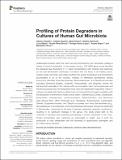Por favor, use este identificador para citar o enlazar a este item:
http://hdl.handle.net/10261/220718COMPARTIR / EXPORTAR:
 SHARE SHARE
 CORE
BASE CORE
BASE
|
|
| Visualizar otros formatos: MARC | Dublin Core | RDF | ORE | MODS | METS | DIDL | DATACITE | |

| Título: | Profiling of protein degraders in cultures of human gut microbiota |
Autor: | Amaretti, Alberto; Gozzoli, Caterina; Simone, Marta; Raimondi, Stefano; Righini, Lucia; Pérez-Brocal, Vicente CSIC; García-López, Rodrigo; Moya, Andrés CSIC ORCID; Rossi, Maddalena | Fecha de publicación: | 2019 | Editor: | Frontiers Media | Citación: | Frontiers in Microbiology 10: 2614 (2019) | Resumen: | Unabsorbed proteins reach the colon and are fermented by the microbiota, yielding a variety of harmful metabolites. In the present study, a 16S rRNA gene survey identified the bacterial taxa flourishing in 11 batch fermentations with proteins and peptones as the sole fermentable substrates, inoculated with the feces of six healthy adults. Organic acids, ammonia, and indole resulting from protein breakdown and fermentation accumulated in all of the cultures. Analysis of differential abundances among time-points identified Enterobacteriaceae, Burkholderiaceae, and Desulfovibrionaceae (including Esherichia-Shigella, Sutterella, Parasutterella, and Bilophila) among the bacteria that especially in the cultures with low inoculation load. Lachnospiraceae and Ruminococcaceae also encompassed many taxa that significantly expanded, mainly in cultures inoculated with high inoculation load, and showed the strongest correlation with the production of ammonium, indole, and p-cresol. Anaerotruncus, Dorea, Oscillibacter, Eubacterium oxidoreducens, Lachnoclostridium, Paeniclostridium, and Rombutsia were among them. Other Firmicutes (e.g., Roseburia, Ruminococcus, Lachnospira, Dialister, Erysipelotrichaceae, and Streptococcaceae) and many Bacteroidetes (e.g., Barnesiellaceae, Prevotellaceae, and Rickenelliaceae) decreased. Sequences attributed to Bacteroides, unresolved at the level of species, presented opposite contributions, resulting in no significant changes in the genus. This study sheds light on the multitude of bacterial taxa putatively participating in protein catabolism in the colon. Protein fermentation was confirmed as unfavorable to health, due to both the production of toxic metabolites and the blooming of opportunistic pathogens and pro-inflammatory bacteria. | Versión del editor: | https://doi.org/10.3389/fmicb.2019.02614 | URI: | http://hdl.handle.net/10261/220718 | DOI: | 10.3389/fmicb.2019.02614 | E-ISSN: | 1664-302X |
| Aparece en las colecciones: | (I2SysBio) Artículos |
Ficheros en este ítem:
| Fichero | Descripción | Tamaño | Formato | |
|---|---|---|---|---|
| profilmicrobi.pdf | 6,8 MB | Adobe PDF |  Visualizar/Abrir |
CORE Recommender
PubMed Central
Citations
37
checked on 04-mar-2024
SCOPUSTM
Citations
67
checked on 24-abr-2024
WEB OF SCIENCETM
Citations
61
checked on 25-feb-2024
Page view(s)
128
checked on 24-abr-2024
Download(s)
131
checked on 24-abr-2024

